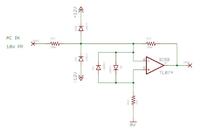juz_ad
Full Member level 2

Some designs/designers put a resistor from the Non Inverting terminal to Ground - while others don't
My understanding is that this resistor can help balance the effects of bias currents on DC offsets and help reject common mode noise.
I've also read that this can potentially cause as many problems as it can solve (on certain op amps?...)
Using the TL074 in both DIL and SOIC in +/-12V circuits running at around audio frequency - is there a 'general' rule or reason to go with one or the other (with resistor or without)?
I can't say that using it has ever 'fixed' anything that I've noticed... but much smarter people than me do decide to use them.
Thanks.
My understanding is that this resistor can help balance the effects of bias currents on DC offsets and help reject common mode noise.
I've also read that this can potentially cause as many problems as it can solve (on certain op amps?...)
Using the TL074 in both DIL and SOIC in +/-12V circuits running at around audio frequency - is there a 'general' rule or reason to go with one or the other (with resistor or without)?
I can't say that using it has ever 'fixed' anything that I've noticed... but much smarter people than me do decide to use them.
Thanks.


